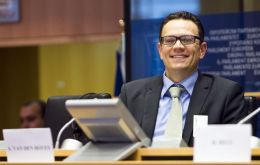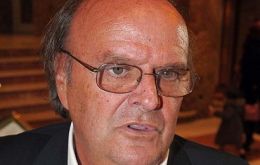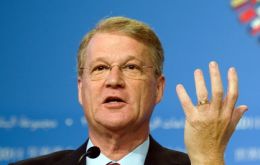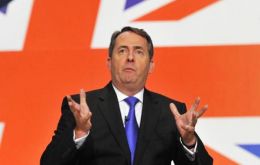MercoPress. South Atlantic News Agency
Stories for 2011
-
Thursday, October 6th 2011 - 02:16 UTC
Uruguayan auto assembly industry exempt of Brazil’s IPI 30% tax increase

In the framework of the so called Plan Maior, Brazil adopted measures to stimulate its industry with the purpose of increasing productivity and containing competition from Chinese produce in its domestic market.
-
Thursday, October 6th 2011 - 01:55 UTC
“Mercosur won’t destroy European agriculture”, says EU business lobby

The head of Business-Europe International Relations said Wednesday that a free trade agreement between the European Union and Mercosur “would not destroy European agriculture” in spite of fears from farmers.
-
Thursday, October 6th 2011 - 01:45 UTC
FIFA bribery allegations: Grondona apologizes for ‘unacceptable’ insults about England

Julio Grondona, Argentina's FIFA vice-president has apologised for his “unacceptable” insults about England, David Bernstein the chairman of the English Football Association said. The controversy at the time also involved bribery allegations and the Falklands/Malvinas Islands dispute.
-
Wednesday, October 5th 2011 - 22:05 UTC
Canadian rating agency upgrades Argentina, but warns about external shock

DBRS rating agency from Canada upgraded on Wednesday its ratings on Argentina's long-term foreign and local currency securities to “B” from B (low). The trends have been revised to Stable.
-
Wednesday, October 5th 2011 - 21:44 UTC
Global financial crisis “starting to affect” Argentina says manufacturers union

The head of the Argentine Industrial Union (UIA), José Ignacio de Mendiguren, warned on Wednesday that Argentina “is starting to be affected” by the global financial crisis, furthering that the country “is not protected” against the situation.
-
Wednesday, October 5th 2011 - 21:39 UTC
Operation Fire Wall: IMF will also chip in funds to protect Spain and Italy

The International Monetary Fund could buy Spanish or Italian bonds alongside the Euro zone bailout fund if needed, to help boost investor confidence in those countries, the IMF Europe head Antonio Borges said on Wednesday.
-
Wednesday, October 5th 2011 - 16:39 UTC
“UK will protect the Falklands as long as they want to remain British” says Defence chief Fox

Britain will protect the people of the disputed Falkland Islands for as long as they want to remain British citizens, Defence Secretary Liam Fox said on Wednesday speaking at the annual conference of the ruling Conservative Party.
-
Wednesday, October 5th 2011 - 16:24 UTC
Brazil wants to ban controversial ad campaign showing super model in knickers

Brazil's ministry for women has called for a TV advertising campaign showing supermodel Gisele Bundchen in just her underwear and high heels to be banned
-
Wednesday, October 5th 2011 - 15:23 UTC
Irrigation channels blamed for spike of typhoid and hepatitis A cases in Chile

Last week Chile’s Institute of Public Health (ISP), together with Metropolitan Regional Health Secretary Rosa Oyarce, began taking samples from irrigation channels in western Santiago in relation to a recent upturn in cases of typhoid fever.
-
Wednesday, October 5th 2011 - 09:29 UTC
Piñera escalates conflict: proposes jailing those involved in occupying schools

Student leaders, the opposition and several judges expressed outrage this week after Chilean President Sebastián Piñera proposed on Sunday to reform the Penal Code to impose harsher punishments on those involved in the occupation of schools and universities, newspaper La Tercera reported.
